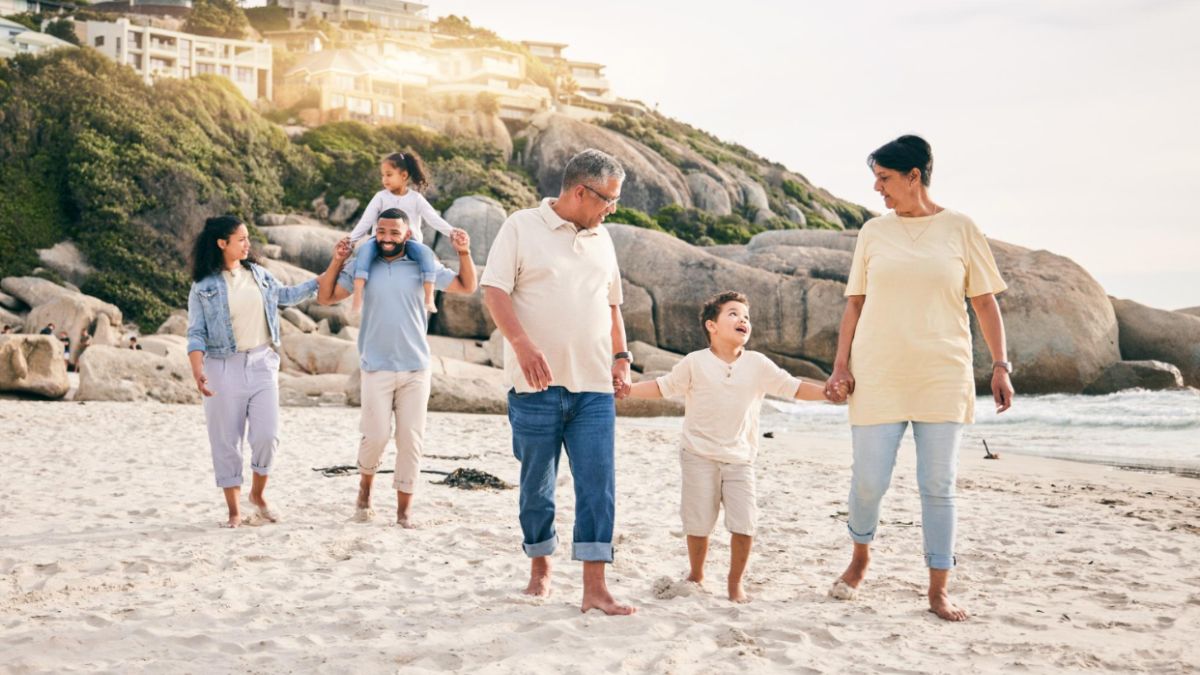Group and Family Travel Planning:
Safety Tips When Traveling with Kids and Seniors
Create Lasting Travel Memories with Your Family
Traveling with groups that include kids and seniors can be a wonderful way to create lasting memories. However, group and family travel planning can also bring challenges that may make a trip feel stressful and overwhelming. Imagine keeping track of everyone’s needs, ensuring everyone stays together, and managing health concerns on the go. It can quickly become a tough task, especially when children and older family members require special care and attention.

That’s where Dorian Destinations comes in. We understand that your family’s safety and comfort are the top priorities during group and family travel planning. Our personalized approach helps you enjoy your luxury journey while we take care of the important details that keep everyone safe and happy.
Secure Travel Experience?
Why Safety Matters in Group and Family Travel Planning
When traveling with kids and seniors, safety takes on a whole new meaning. Different age groups have unique needs. Children might get tired quickly, lose track of their parents, or need special medical care. Seniors may face mobility challenges or health concerns. Group and family travel planning must include clear safety measures so everyone feels secure and enjoys the trip.
Key Safety Tips for Group and Family Travel Planning
Research Your Destination Thoroughly
Before you pack your bags, learn all you can about your travel location. Check if the area is safe for children and seniors. Look into local healthcare services and emergency facilities. Knowing what to expect reduces surprises and helps you prepare appropriately. Review official travel advisories and save emergency numbers and nearby hospitals/clinics in advance; keep digital and paper copies with your itinerary.
Create a Detailed Travel Plan
Making an itinerary that lists all activities, meal times, rest periods, and meeting points is essential for successful group and family travel planning. Sharing this detailed plan with every family member means everyone knows what’s happening, making it much easier to stay together and avoid confusion. Dorian Destinations can help create and organize personalized itineraries, making your travel experience smoother and more enjoyable for everyone involved.
Prepare Emergency Contacts and Documents
Have a list of emergency phone numbers written down and stored in multiple places. Carry copies of important documents such as passports, travel insurance, and medical records. This ensures you’re prepared even if your phone runs out of battery or gets lost. Keep both digital and printed copies of passports, prescriptions, travel insurance documents, lodging details, and local emergency numbers in separate places. Store digital copies on encrypted or password-protected devices or apps to maintain privacy and security.
Set Up a Buddy System
Pair up family members, especially kids and seniors. Each partner watches out for the other. This simple system helps prevent anyone from wandering off and keeps everyone safer.
Pack a Travel Health Kit
Include adhesive bandages, antibiotic ointment, antiseptic wipes or solution, pain/fever relievers, allergy medication, and children’s medicines with a syringe or medicine cup for accurate dosing. If anyone has special prescriptions, be sure to pack enough for the entire trip plus extras.
Use Technology to Stay Connected
Download apps that help with group coordination, like location sharing and emergency alerts. For international trips, U.S. citizens and nationals can enroll in the U.S. Department of State’s Smart Traveler Enrollment Program (STEP) to receive security, health, and weather alerts from U.S. embassies and consulates. Make sure everyone’s phone is charged, and carry portable chargers. Ensure phones have international roaming or local SIM cards, especially when traveling outside your home country.
Tips for Traveling Safely with Kids

Teach Kids About Safety Rules
Before your trip, talk to children about what to do if they get lost or feel scared. Teach them your phone number and the hotel address. Give younger children an ID bracelet or card with your contact info and key medical details, and practice what to do if they’re separated (stay put and ask a uniformed official or another parent with kids for help).
Keep Entertainment Handy
Boredom can make kids restless and lead to risky behavior. Bring games, books, or movies to keep them entertained during long waits or travel times.
Watch Water Safety Closely
For boating and natural water (lakes, rivers, ocean), make sure children wear U.S. Coast Guard–approved life jackets; at pools and waterparks, consider life jackets for weak swimmers. In all settings, provide close, constant adult supervision. Consider swimming lessons before you travel.
Tips for Traveling Safely with Seniors
Consider Mobility Needs
Choose accommodations and attractions that are accessible. Look for elevators, ramps, and easy walking paths. Plan for plenty of rest breaks.
Manage Medications and Health Conditions
Keep medications organized and with you at all times. Remind seniors to drink plenty of water and avoid overexertion. Know the location of the nearest hospital or urgent care center. Keep all medicines in your carry-on, in original labeled containers, and bring copies of prescriptions (including generic names). Check your destination’s regulations regarding prescription medications, as some countries restrict certain drugs or require additional documentation.
Monitor Weather and Environment
Seniors may be more sensitive to heat, cold, or altitude changes, so dress appropriately and avoid extreme weather conditions. In hot weather, older adults should drink more water than usual, limit strenuous activity, and watch for heat-illness symptoms (e.g., cramps, headache, nausea). Altitude illness can begin around 8,000 ft (≈2,450 m), with risk increasing as you go higher; above ~10,000 ft (3,050 m), take extra caution, ascend gradually, and discuss prevention with your clinician.
How to Handle Group Safety During Outings
Agree on Meeting Points
Choose a clear, easy-to-find place to meet if someone gets separated. Make sure everyone understands this location.
Use Matching Items for Easy Identification
Wear matching hats, T-shirts, or bracelets to spot your group quickly in crowded places.
Stay Alert in Crowded Areas
Keep close to your group and avoid distractions. Watch out for pickpockets and scams.
Steps to Follow if Someone Gets Lost
Stay Calm and Don’t Panic
Keeping calm is the most important step if someone gets lost, as panic can make it harder to think clearly and take effective action.
Go to the Agreed Meeting Point
Head straight to the agreed meeting spot, where everyone knows to gather in case of separation, making it easier to reunite without confusion.
Alert a Nearby Official or Security Guard
Find a nearby official, security guard, or trusted person who can help manage the situation and assist in locating the lost person safely.
Use Phone or Communication Devices if Available
If phones or communication devices are accessible, use them to call or message the lost person or other group members to coordinate the reunion.
Search the Last Known Location Together
Organize a calm, careful search around the last place the person was seen while keeping everyone informed and cooperative during the process.
Frequently Asked Questions
What Are the Best Ways to Keep Kids Safe When Traveling?
The best ways to keep kids safe when traveling include teaching them safety rules, giving them ID cards with contact info, supervising them closely near water, and keeping them entertained to avoid risky behavior.
How Can I Accommodate Seniors’ Needs During Family Trips?
You can accommodate seniors’ needs during family trips by choosing accessible accommodations, planning rest breaks, managing medications carefully, and preparing for environmental sensitivities like weather.
What Should I Do if a Family Member Gets Lost During Travel?
If a family member gets lost during travel, stay calm, go to the agreed meeting point, alert nearby officials, use communication devices, and search the last known location with the group.
How Can Technology Help in Group and Family Travel Planning?
Technology can help in group and family travel planning by allowing families to share locations, send emergency alerts, manage itineraries, and keep everyone connected throughout the trip. It can also deliver official embassy safety alerts (via STEP) and help you store critical documents securely for offline access.
Keeping Safety a Priority

Group and family travel planning takes extra care, especially when traveling with kids and seniors. Keeping safety a priority makes the journey enjoyable and stress-free. At Dorian Destinations, we focus on helping you plan luxurious and secure trips where every family member feels cared for and protected. With the right preparation, your family can create unforgettable travel memories filled with joy and peace of mind.
Let Dorian Destinations handle the details so you can focus on the fun and togetherness.
Dorian Destinations
(305) 440-9200


